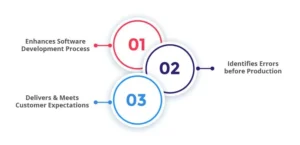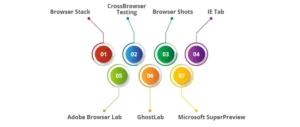Recommended Blogs
Compatibility Testing – An Integral Part of Digital Transformation
February 9, 2023

The technology domain has been changing drastically and in quick progressions too. Since the past decade, if we compare, there has been a significant increase in the number of browsers used for surfing the internet. Therefore, it is essential to make the website compatible across all browsers. Since it is difficult to evaluate each visitor’s personal choice of a browser, it is imperative to ensure that a website functions well across all major browsers, be it over web or mobile devices. A situation like this makes it essential to perform a compatibility test before deploying any application.
Compatibility testing is a process of reviewing and comparing application functionality and styles across several browser platforms, mobile devices and operating systems, to identify any potential inconsistencies. This non-functional testing ensures complete customer satisfaction, as it validates whether the application performs as expected across all platforms.
Compatibility of a system, application or website is built with various factors and objects, such as databases, web browsers, hardware platforms, operating systems, users, mobile devices, networks, etc. Compatibility testing is conducted on the applications to assess the application’s compatibility with different environments. It can be performed manually or through automation tools.
The answer is yes! Compatibility testing ensures that there is no loss of business if a potential customer visits you on any platform. A company might seem unprofessional if the customer does not find it compatible with the browser or device he is using. Another prime reason for having a website which is compatible across all browsers and platforms is the need to stand out.
However, by continuously running behind the need to stand out and look professional, this makes it essential for companies to have a responsive website that works in all browsers and devices. For this, web designers need to make the web design such that it works well in all the browsers.
Software applications released should be compatible with all software, hardware, OS, platforms, etc., which can only be achieved by opting for compatibility testing. Compatibility testing helps in detecting errors before the product is delivered to the end user. It helps in validating whether the product meets all the requirements set and approved by both the developer and the end user.
A product that is stable and high in quality helps in improving the reputation of the company and drives the company to achieve continuous success. In fact, it not only improves the reputation of the company but also boosts the marketing efforts and enhances customer delight.

Compatibility testing assesses the problems in the software in the development process itself. Hence, it becomes easier to validate the application’s stability, usability, and scalability across various platforms and deliver feedback. Also, with the feedback obtained with this testing process, it helps to analyze defects if any in the development stage itself. Thus, it helps in enhancing the software development process.
Compatibility testing is capable of timely identification of the defects in mobile and web apps even in the difficult areas. Since defects are identified earlier before production, the testing practice gives enough time for the developer teams to fix them at the earliest. Moreover, this decreases the time-consuming tasks such as resolving compatibility issues for various browsers, OS, or devices as defects are identified early.
Compatibility testing ensures to meet the fundamental expectation of users. The testing practices effectively performs system compatibility tests on different browsers, platforms, configurations, OS, hardware, etc. Thus, as compatibility tests are performed on the app, it ensures to deliver best customer experience.
There are basically two types of compatibility testing named as Software compatibility testing and Hardware compatibility testing. They are further divided into different categories detailed below.
Testing is carried out to check the compatibility of different hardware configurations with the software.
Compatibility testing is carried out to check the software or applications compatibility with different operating systems, such as Linux, Mac, Windows, UNIX, etc.
This method of compatibility testing involves the testing of software’s compatibility with different software. There are 5 different categories under this testing.
Testing is performed on different mobile devices such as Windows, iOS, and Android to check whether the app developed is compatible or not.
Testing is carried out to check the software’s compatibility with and its performance in different networks such as Wifi, 5G, 4G, etc. The software is assessed on the basis of variable parameters such as capacity, operating and speed bandwidth
Testing is carried out to check the software’s compatibility with different software versions.
The software or app is tested in different devices such as Bluetooth, USB, etc. to check its compatibility.
The software or the application is tested in different browsers such as Chrome, Firefox, Yahoo, Bing, etc.
In this stage, the team designs test cases and an analysis of the environments, software, hardware, and platforms should be taken up to identify the behavior of software. It is essential to involve a team with professionals having good knowledge of compatibility testing as they will be able to identify even small variations in output.
In this step, the test engineers are required to set up the environment, or the platform where the application is expected to be tested and validated.
After setting up the environment, the teams execute the test cases and analyse the results. The outcome of the test cases is analyzed and the bugs or the discrepancies/defects are noted to submit to the stakeholders
Once the result is generated and analyzed; the report is submitted to perform the next level of analysis. Here, the identified defects or errors are validated and resolved. Also, the developed software will be re-tested to ensure that the software meets the quality with no bugs and defects before moving it to actual production.
When browsers, devices, and OS versions change all the time, manual compatibility testing doesn’t work well. That problem is fixed by automation.
Automated compatibility testing enables teams to check hundreds of configurations simultaneously, reducing execution time and minimizing human error. It’s the only approach to keep coverage in fast-release cycles that makes sense.
Automation works well in areas with a lot of regression, such as rendering in browsers, core workflows, and smoke tests on devices. These tests can run on every build without extending the delivery time.
Modern compatibility testing tools work with CI/CD pipelines, so they can test across browsers, devices, and platforms all the time. This helps teams find problems before they go into production.
Automation needs the correct test design, environment strategy, and maintenance model when it is done on a large scale. This is where a TestingXperts-led compatibility testing solution helps teams find the right balance between coverage, speed, and cost while lowering long-term test debt.
– Defects due to broken tables or frames
– Issues after making variations or modification in the User Interface (UI) i.e. with respect to look and feel
– Defects with scroll bar
– Alignment issues can affect the software compatibility
– Issues because of change in color or style in CSS
– Change or variation of the font size and font style
Not because teams don’t pay attention to it, but because it’s hard to handle on a large scale, compatibility testing fails. These are the most common places where things go wrong and how to fix them.
There are an increasing number of combinations of devices, operating systems, and browsers. Instead of testing everything equally, focus on real user statistics, market share, and business-critical flows.
Automated tests often fail when the UI or settings change. Using a modular test design and stable selectors reduces rework and makes automation more dependable.
Maintaining old browsers and physical devices is costly. Cloud-based test environments enable teams to use real devices and settings whenever needed.
It’s expensive to resolve compatibility issues that arise after release. Moving compatibility testing to an earlier stage in the product’s life cycle helps avoid having to fix problems after launch.

This is a browser compatibility testing tool that effectively helps in testing the browser compatibility over 2000+ real devices and browsers such as Chrome, Opera, Safari, Internet Explorer, etc. and mobile versions such as Nexus, iPhone, and Samsung Galaxy.
This is one of the best browser compatibility testing tool that helps in performing compatibility testing on multiple browsers and operating systems. It helps to test on 2050 real desktop and mobile browsers. This tool is a widely preferred browser testing tool as it supports Flash, JavaScript, and Ajax.
This is an open-source compatibility testing tool used to test website’s browser compatibility. It helps testers and developers to validate the look and feel of the website easily with the exclusive feature to take screenshots of the website on different browsers and different operating systems.
This is an add-on available for Mozilla and Chrome and it is well known as the free tool with simple usage. It is effectively used by the test engineers to perform website compatibility testing in the Internet Browser.
This is an online service used for cross-browser testing. This tool is effective to compare the screenshots of web pages in different web browsers. It is also used to preview, compare and display the website content.
This tool works with any site and any device and helps to test any website on various browsers and mobile devices.
This is also a popular stand-alone visual debugging tool that helps to debug websites for cross-browser compatibility.
In brief, the multiple roles and advantages of compatibility testing makes it an essential part of the software development process. By validating compatibility with an end-user’s environment and making sure that the application performs well in all browsers, OSs and networks can help to deliver assured of customer satisfaction.
TestingXperts’ comprehensive compatibility testing services are executed across different browsers, OSs, databases, hardware, servers, different configurations, etc. Furthermore, our end-to-end cross-browser Test Automation framework, Tx-Automate, helps testers ensure that the application runs efficiently on all the preferred browsers, leading to a pleasant customer experience and successful application usage.
Compatibility testing finds layout breaks, functional failures, and performance problems that users would otherwise have to deal with when the software is released by testing it in real-world settings before it is released.
The best tools work with real devices, various browsers, and CI/CD. Instead of just looking at how popular a tool is, you should also look at how well it works on different platforms, how fast it runs, and how easy it is to keep up.
Make a priority matrix using analytics data, customer demographics, and the most important user journeys for your organization. First, focus on platforms that get a lot of traffic and make a lot of money.
Users think that broken layouts or failures mean bad quality. Consistent performance across platforms promotes trust, lowers churn, and improves how people see your business.
Yes. AI-driven testing can identify visual problems, usage patterns, and errors that occur only in specific environments more quickly than manual checks, especially when there are numerous configurations to review.
Discover more